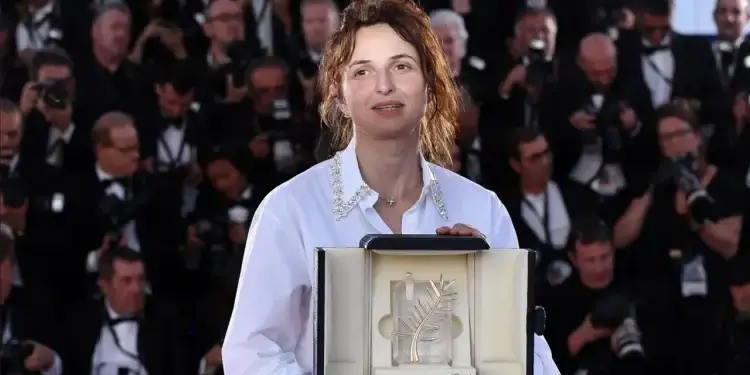It is a singular voice of European cinema that the Cannes Film Festival chose to chair the jury of the Golden Camera in 2025: Italian director and screenwriter Alice Rohrwacher succeeds the duo formed by Emmanuelle Béart and Baloji last year, to reward the best first feature film presented in one of the three major sections of the festival – the official selection, Fifteen filmmakers.
This choice is in logical continuity as the filmmaker has an intimate and fruitful relationship with the festival. For more than a decade, Cannes has accompanied the trajectory of Alice Rohrwacher, revealed it, celebrated, and now invites him to take his precise and poetic gaze on the works of the cinematographic succession. This look, she will put it during the closing ceremony on Saturday May 24, where she will hand this coveted gold camera, which, in 2024, had crowned Convening from the Norwegian Halfdan Ullmann Tøndel.
In a statement included in the official press release, Alice Rohrwacher evokes with emotion the strength of the beginnings: ” The first times are always important and accompany us all our lives. As we enter an unknown room, as we approach it to be loved for a first kiss, as we dock on a foreign shore. There is something golden that surrounds these moments in our memory. Is that why the most prestigious prize devoted to the first works is called the Golden Camera? These words, where a deep artistic sensitivity resonates, say a lot about the importance it attaches to beginnings – these suspended moments, so dear to her cinema.
His work, precisely, is itself crossed by this theme of awakening in the world. In 2011, Corpo Celestehis first feature film, is selected at the Directors’ Fortnight. This portrait of a 13 -year -old adolescent girl confronted with the Catholic religion and the social hostility of the south of Italy seduces criticism with her maturity of tone and the intelligence of her staging. It also reveals a separate style, anchored in realism but constantly crossed by an inner light, a sweetness of gaze which does not exclude irony or hardness.
In 2014, Alice Rohrwacher accesses the official competition with The Meraviglie (Wonders), a largely autobiographical work which stages a family of beekeepers living on an isolated farm, cut off from the world, until the emergence of a reality show. This film, both intimate and political, wins the Grand Prix of the Jury. Through him, the filmmaker already draws a clear line: to be interested in margins, childhood, innocence, in memory of ancestral places and gestures.
Five years later, Lazzaro Felice (Happy like Lazzaro) is presented again in competition. This modern tale turned upside down by his timeless account: a candid young man, Lazzaro, discovers that he and his family were kept in a state of easement in rural exploitation, even after the abolition of serfdom. The film then rocks in a second metaphorical part, where the hero crosses time and the city, without ever losing its purity. This account that is both biblical and political wins the ex-aequo scenario prize, devoting the singular writing of Alice Rohrwacher.
In 2023, the filmmaker was again present in competition with The chimerainterpreted by Josh O’Connor, Carol Duarte and Isabella Rossellini. The film, which forms a trilogy with its two long preceding, questions our relationship to the past through the story of an archaeologist involved in the traffic of Etruscan Antiquities. The chimera is distinguished by its formal ambition, its mixture of dialects and languages, and its fragmented structure, as haunted by the echoes of the past. Alice Rohrwacher continues her reflection on loss, memory, and invisible injuries.
But the director’s work is not limited to her feature films. She also produced several short and medium -sized films, investing both documentary and fiction. As early as 2006, she co-signs Checosamancacollective documentary on Italian youth. In 2021, she participated in Futuraanother collective documentary codirigated with Pietro Marcello and Francesco Munzi, who gives voice to young Italians on their hopes and their fears for the future.
She also explores singular brief forms: Quattro Stradeshort film shot during containment in Super 16, is a poetic neighborhood chronicle, while The pupilproduced by Alfonso Cuarón and selected in Cannes in 2022 before being appointed to the Oscar for the best short film, shows once again its interest in childhood, spirituality and the absurd rules imposed on bodies. Finally, in 2024, she co -realized with the artist JR a new short, Citadine allegoryContemporary and visual variation on the allegory of the Plato cave.
This route shows how Alice Rohrwacher has built a coherent work, anchored in a vision of cinema as a place of transmission and awakening, where the wonderful and the real coexist without hierarchy. She borrows from Sica’s neorealism for tenderness towards her characters, to the Baroque de Fellini for freedom of tone, while affirming a totally personal voice, often carried by the landscapes of central Italy, by the earth and its myths.
To see her preside over the jury of the gold camera, award celebrating the beginnings, the first times, is therefore anything but a coincidence. On the contrary, it is a fair return of this loyalty built film after film with Cannes. The selection of a first feature film will be, for her, neither a simple critical exercise, nor an honorary formality: it will be a form of passing, recognition and bet on the future. Because Alice Rohrwacher has not ceased, since its beginnings, to capture this uncertain and precious light of beginnings, this “something golden” which she speaks so right in the press release.
Neïla Driss









